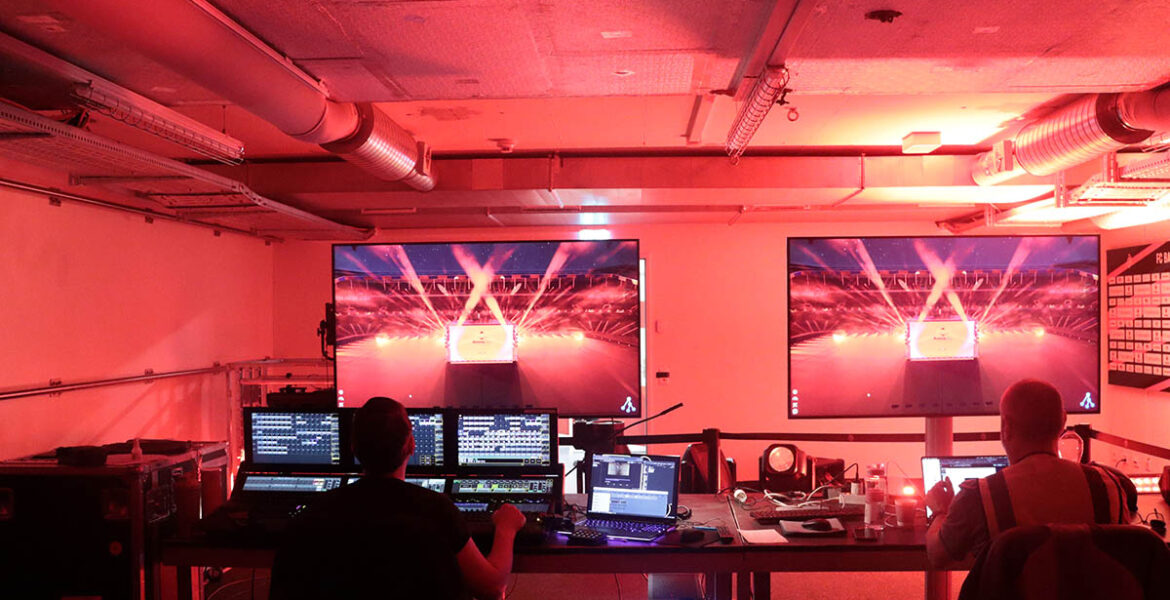With the return of Christoph Bosshardt, Head of Basel’s External Relations and Location Marketing, from vacation, the knot of the Eurovision content removal from YouTube finally unravels, more than two months after the Arena Plus event. As it turns out, the government body that requested the Swiss ban of videos containing subliminal calls for Jihad funding during Baby Lasagna’s performance was not the City of Basel but the neighboring suburban cousin – the Canton of Basel-Landschaft (Baselland for short).
The advisors on cybersecurity noticed the “damaged frame” only after the event, requesting the YouTube removals without informing the Canton they were engaged to advise for two months!
The bizarre incident, which was largely ignored for weeks by both the Croatian performer and the city host of the event at St. Jakob-Park stadium on May 17, now finally gets some resolution thanks to the city official who previously had to tackle a hot potato of censorship, bringing even the National Cyber Security Centre in the explanation of the timeline.
The final version of what actually happened looks somewhat different. “Google Switzerland was informed about the damaged frame by the Cybercrime Department of the Canton of Basel-Landschaft on May 23 and asked to remove the content from YouTube”, Bosshardt found out after a deeper dig. “The legal department at Google Switzerland apparently also concluded that it would be problematic if the frame continued to be broadcast on YouTube and blocked the videos accordingly.”
The mentioned Cybercrime Department had acted in an advisory role regarding the cybersecurity of Switzerland’s largest ESC public viewing event. These advisors noticed what is now called a “damaged frame” and attributed it to a third party, a stock footage provider in Australia, only after the event.
And then, it took us weeks to find out that it was exactly the cybersecurity advisor who requested the Eurovision content removal from YouTube. This department, Bosshardt clarified, “is based in a different canton, which is why this information was not automatically shared within the Canton of Basel-Stadt” (the canton that engaged it for the advisory role).
If you can see the following video, thank this privilege to not being in Switzerland!
No Damage Done – Except to YouTubers
In a separate statement to regional daily newspaper bz Basel, Christoph Bosshardt reiterated that Basel-Stadt did not file a complaint about the controversial Eurovision visuals, and added: “No damage has been done.”
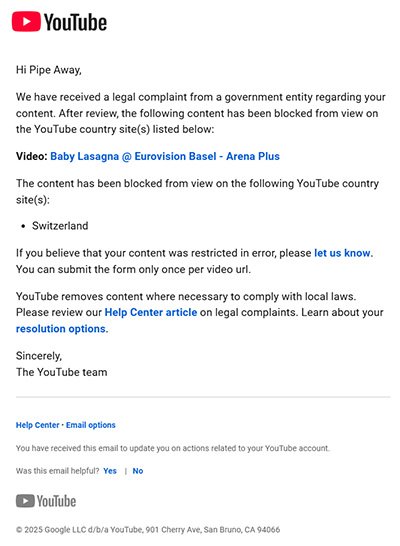
But the story doesn’t wrap up so neatly. Besides the general idea that “calls to support a criminal organization are punishable by law in Switzerland”, no clarifications for the takedown of videos from various independent YouTube channels were offered.
Indeed, if calls to support criminal organizations are punishable, then who’s being prosecuted for dispersing this call at Arena Plus? For now, it seems YouTube content creators have taken the direct hit for the “punishable call” projected in front of thousands of stadium visitors – not by these YouTubers who merely documented what was shown, but by the City of Basel. The City that now says, “No damage has been done.”
In fact, in the same bz Basel article, titled “ESC in Basel hacked by Islamists”, Bosshardt offered more background: “The video effects were put together by us, but the person in charge had already acquired the raw material a few years ago.”
So, if we have an event where supposedly “no damage was done”, with outdated materials that circulated on the web for years, and now flashed in front of the Eurovision eyes in speeds that would have to establish subliminal marketing as a source of miraculous influence, and then also this call featuring an email address that doesn’t exist, and a bitcoin wallet that’s been technically dead since 2015… What crime are we actually talking about?
On one hand, we’re told this was a serious security threat worthy of cybercrime intervention. On the other hand, officials downplay the impact. How can it be both – a threat severe enough to pull the plug on YouTube creators, yet also something so inconsequential that “no damage has been done”?
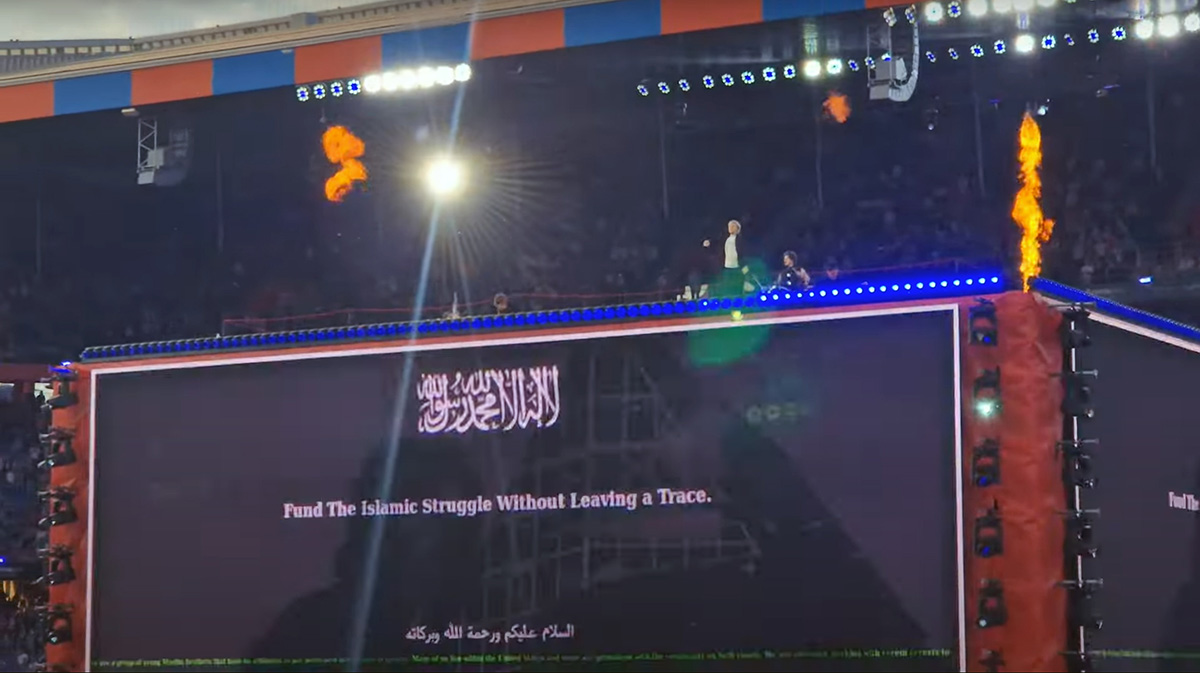
Basel Police: ‘We know nothing’
The bizarre story might end up being as ephemeral as the fleeting frames that launched the avalanche of interpretations.
If what appeared on screen truly qualifies as a crime – punishable by law in Switzerland – then what exactly is law enforcement doing about it? As indicated by bz Basel, not much: “The Basel-Stadt cantonal police have no knowledge of the incident in St. Jakob-Park, according to the police.”
That’s an interesting claim, considering Basel-Stadt cantonal police were formally notified of the incident on June 23rd – by Pipeaway. In fact, the Department of Justice and Security of the Canton of Basel-Stadt responded to our request for information with an automatic thank-you note, saying: “We will process your message within working days during our office hours.”
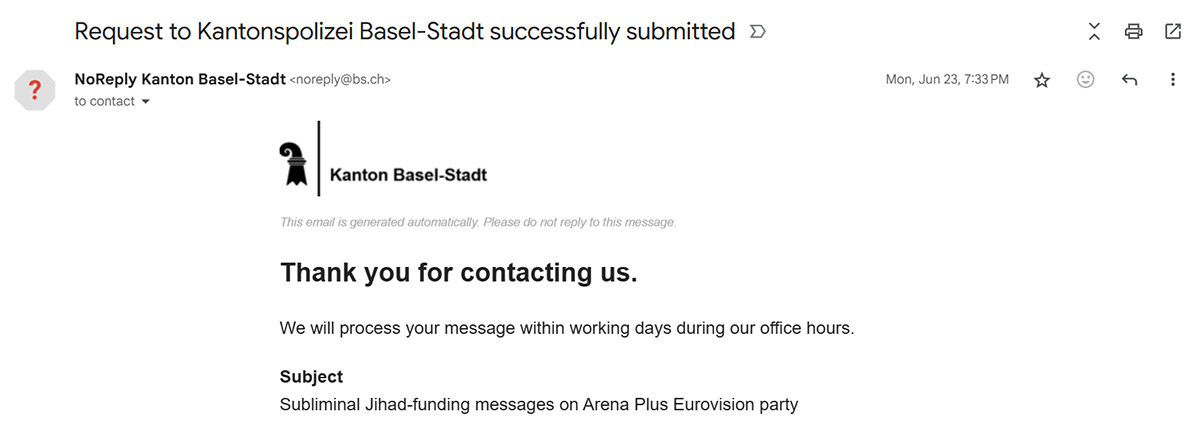
In their defense, they didn’t specify within how many working days the answer could be expected. So, on July 1st, we followed up. Again, no response.
And now? They say that they “have no knowledge of the incident”.
The entire saga of Eurovision’s subliminal whispers might go down in local history as a story of institutional silence, where all included actors, from the artist and the concert management to the police, went mute.
When a vague allegation of conspiracy is used to justify a nationwide censorship (the one Cybercrime Department of the Canton of Basel-Landschaft never even thought of announcing publicly, until pushed by the press), silence is not the best communication tactic.
That is, if the idea of some “Islamist conspiracy” was not just a smoke screen for a completely different story.
Have something to add to this story?
Leave your comment in the section below, and pin the article for later!
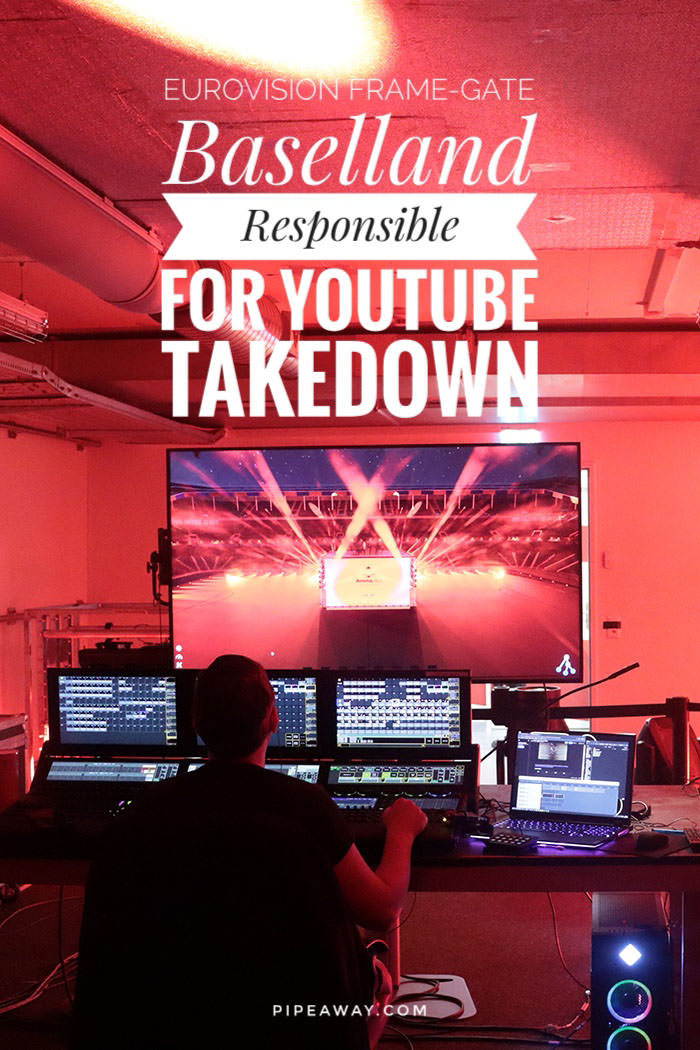
Disclosure: This post may contain affiliate links, meaning if you click on them and make a purchase, Pipeaway may make a small commission, at no additional cost to you. Thank you for supporting our work! Cover/pin image in this article has been sourced from Mood Studios AG via Kanton Basel-Stadt. Screenshots by Pipeaway.

